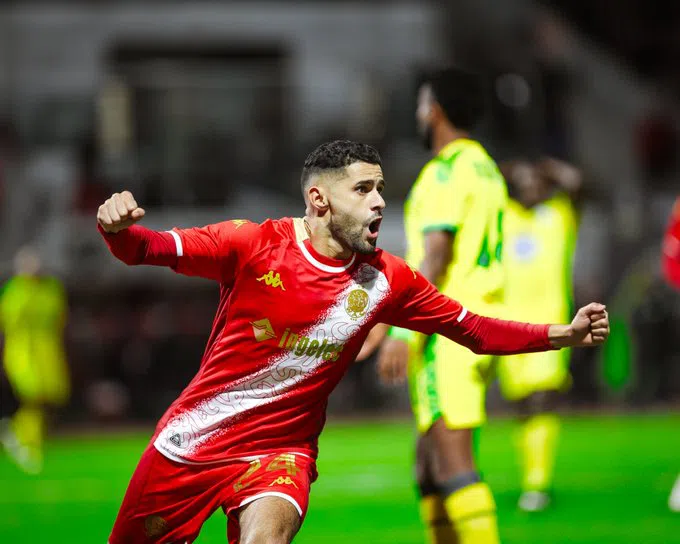On a hot and hostile Casablanca night, former African champions Wydad Athletic Club reminded the continent why they are still royalty, handing debutants Nairobi United a bruising 3–0 defeat in their opening CAF Confederation Cup group stage clash at Larbi Zaouli Stadium.
For Wydad, it was a confident stride into a competition they fully expect to challenge for. For Nairobi United, it was a painful but valuable reality check at the very peak of African club football.
From Kagumori grounds to Casablanca lights
To fully understand the weight of this night, you have to rewind two years, to a dusty pitch at Kagumori Grounds in Eastern Kenya. That is where Nairobi United, then a little known third-tier side, saw a 13 match unbeaten run snapped by 3K FC.
From that setback they climbed through the ranks, winning promotion to the National Super League, then storming into the FKF Premier League and lifting the FKF Cup while still a second tier club. That fairy tale run booked them a ticket to the CAF Confederation Cup, where they joined giants like Wydad AC, AS Maniema Union and Azam FC in Group B.
They are only the second Kenyan side after Gor Mahia to appear in the group phase of the competition. For a club that not long ago was fighting for visibility in the lower leagues, walking out in Casablanca in front of an intimidating North African crowd was already a historic leap.
Group B picture and Nairobi’s uphill climb
Even before a ball was kicked, the dynamics of Group B were clear. Azam FC coach Florent Ibenge, a man who knows continental football inside out, openly named Wydad and AS Maniema Union as the favourites, casually leaving Nairobi United out of the spotlight.
His verdict was rooted in experience. Maniema were recently in the CAF Champions League group stage, and Wydad are three time Champions League winners with a deep continental pedigree. Nairobi United, by contrast, are debutants at both FKF Premier League and CAF group level.
Yet Nairobi arrived with a compelling backstory. They had eliminated Etoile Sportive du Sahel on penalties after a dramatic 2–2 aggregate battle, winning 2–0 in Nairobi before losing 2–0 in Tunis. They showed resilience in hostile North African territory once, so the trip to Morocco came with quiet belief.
Wydad respect the threat but target three points
On the Wydad side there was no complacency. Coach Mohamed Amine Benhachem and captain Nordin Amrabat repeatedly stressed that they expected a difficult match, especially because of Nairobi United’s speed and danger in transition.
Benhachem described the Kenyan champions as rapid in transition and warned that if Wydad pushed too many numbers forward, Naibois could exploit the spaces on the counter. His message was clear, maintain possession, create spaces, score goals, but stay alert to the Kenyan counters.
Amrabat, the experienced former Watford winger, also underlined that the international break had been a blessing for Wydad, giving the squad 10 days of focused preparation. He spoke of one non negotiable objective in front of their home fans, secure all three points.
Nairobi United arrive with belief and a clear plan
On the opposite bench, coach Salim Ali cut the figure of a man fully aware of the scale of the task, yet unwilling to be overwhelmed by it. Nairobi United had prepared specifically for Wydad’s strengths, and Ali believed he had identified weaknesses in the Moroccan defence that his side could exploit.
Ali talked of pressing the right buttons, of taking advantage of Wydad’s defensive lapses while minimising their lethal attacking strengths. There was realism, but there was also quiet ambition. His words before the match captured that balance between respect and defiance.
“We know it is going to be a difficult game, but what matters is 90 minutes,” he said, emphasising discipline, work rate and execution. The one major blow in his plans was the suspension of defender Yusuf Mainge due to yellow card accumulation, a big gap in a back line already under scrutiny for recent goals conceded.
Wydad’s structural superiority from the first whistle
Once the game kicked off, the gulf in structure, tempo control and tactical maturity became obvious. Wydad settled immediately into a fluid 4-3-3 with a clear identity both on and off the ball.
Benabid El Mehdi started in goal behind a back four featuring Ayoub Boucheta and Mohamed Bouchouari as attack minded fullbacks, with Guilherme Ferreira and Bart Meijers providing stability at centre back. In midfield, Lamirat Abdelghafour and Joseph Bakasu formed a disciplined double pivot, with Stephane Aziz Ki operating just ahead of them in the half spaces.
The front three of Amrabat on the right, Thembinkosi Lorch on the left and Hamza Hannouri centrally gave Wydad width, penetration and sharp movement. It was a system drilled to dominate territory, recycle possession and suffocate opponents with constant waves of pressure.
Nairobi United responded with a compact 4-4-2, built around a clear idea, stay narrow, block passing lanes, soak pressure, then break quickly, especially down the right channel. Kevin Oduor started in goal, with a back four of Prince Buregeya, Kevin Osanya, Lennox Ogguttu and John Otieno in front of him.
In midfield, Brian Omondi and Lesley Owino formed the double pivot, while Shami Mwinyi and Duncan Omalla worked the flanks. Enock Machaka floated behind striker Michael Karamor, tasked with connecting transitions. The plan depended heavily on Karamor’s ability to hold up long balls and bring others into play.
The early Wydad punch that shattered Nairobi’s script
For all of Nairobi’s planning, it took Wydad just three minutes to tear the script apart. After an early spell of pressure, Lorch found space down the left and picked out Ayoub Boucheta, who reacted fastest to a loose ball in the box and finished calmly to make it 1–0.
That goal was more than just an early lead. It blew up Nairobi United’s carefully constructed strategy of sitting compact, absorbing pressure and then countering at the right moments. Suddenly, they were chasing the game against a side that thrives when opponents are forced to open up.
Coach Ali later admitted that conceding so early distorted their game plan. The intention had been to defend well, sit back and break on the counter, but the first goal pushed them into uncomfortable adjustments against a superior opponent.
Wydad control territory, Nairobi cling to half chances
With the crowd roaring them on, Wydad tightened their grip. Aziz Ki began dictating from midfield, switching play diagonally to Lorch, who repeatedly forced Oduor into action. On the right, Amrabat threatened with his dribbling and clever movement inside the box.
One of the game’s key features was Wydad’s territorial control. Their double pivot sat in front of the defence, allowing both fullbacks to push very high. That created reliable overloads on the wings and pinned Nairobi’s wide midfielders deep for long spells.
Nairobi’s first real opening came from exactly the type of transition they had hoped to exploit. Released through on goal by Machaka, former Tusker and Kakamega Homeboyz man Shami Kibwana raced into space but dragged his shot wide. It was arguably their best chance of the half, and one that symbolised their struggle for composure in big moments.
That miss seemed to reawaken Wydad. Lorch again went close, Amrabat combined with Aziz Ki, and Nairobi found themselves increasingly relying on Oduor’s interventions and last ditch defending. Their attempts to bypass the Wydad press with long balls often ended with Karamor isolated against two dominant centre backs.
Bouchouari’s beauty and a psychological hammer blow
As the first half wore on, the second Wydad goal felt inevitable. It eventually came from the left back, Bouchouari, who had been a constant outlet on the flank.
After a ricochet outside the Nairobi United box, the fullback stepped onto the loose ball and curled a delightful strike beyond Oduor. It was a goal that reflected not just individual quality but the territorial dominance Wydad had enjoyed for most of the half.
For Nairobi, conceding in the 44th minute was a psychological hammer blow. At 1–0, there was still a path back if they could find a moment of precision on the counter. At 2–0 down, away from home against such a seasoned side, the mountain suddenly looked like a cliff.
Second half adjustments but the same pattern of struggle
In the second half Nairobi tried to tweak their structure to cope with the relentless pressure. At times they shifted into a 5-4-1, with Shami Mwinyi dropping into the back line to track Wydad’s surging fullbacks and provide extra cover.
Karamor was left as the lone outlet up front, fighting a lonely and often losing battle against Wydad’s centre backs. Even when Nairobi recovered the ball, poor spacing and limited support meant they usually lost it again within seconds.
There were still brief moments of promise. Duncan Omalla fired from range and missed narrowly. Machaka connected with a delivery from Kibwana but could not hit the target. In one sequence, Nairobi thought they had finally broken Wydad’s resistance when Kibwana set up Machaka to score, only for the assistant’s flag to cut short their celebrations.
| CASINO | BONUS | INFO | RATING | |
|---|---|---|---|---|
|
bonus
500% bonus on first 4 deposits!
See 5 Bonuses
|
info
10 crash games, mobile-first site, 500% welcome bonus BK 000678 |
|||
|
bonus
Sign up for KES 46 bonus after first deposit!
See 11 Bonuses
|
info
20+ crash & instant games, Aviator bonuses BK 0000704 |
|||
|
bonus
New players get 50 free spins and a Ksh 2500 freebet!
See 7 Bonuses
|
info
BK 0000665 PG 0000405 Good combination of online casino and betting platform |
|||
|
bonus
Win Ksh 30,000 daily in Aviator tournament!
See 8 Bonuses
|
info
20+ software providers, Aviator+ other crash games, BK 0000671 PG 0000428 |
Rayhi’s late finish seals a complete Wydad performance
As Nairobi chased the game in the final stages, the spaces behind them widened, exactly what Wydad had been waiting for. Benhachem’s men showed no rush, instead maintaining a controlled tempo, conscious of their busy schedule ahead.
Then, in the 86th minute, the Moroccan side delivered the final blow. Substitutes Sabbar and Mohamed Rayhi combined brilliantly down the flank, slicing through a tired Nairobi defence. With Oduor rushing out, Rayhi kept his composure and lifted a cheeky left footed finish over the goalkeeper to make it 3–0.
The scoreline captured the realities of the night, Wydad’s technical security and structural superiority, Nairobi United’s brave but ultimately outgunned resistance, and the difference in experience at this level.
Benhachem’s tactical maturity and Wydad’s wider ambitions
After the final whistle, coach Benhachem spoke of tactical maturity as the defining feature of Wydad’s performance. His staff had predicted Nairobi’s low block approach and worked to exploit it through players like Bouchouari and Boucheta, who attacked from fullback with intelligence and timing.
He also explained that Wydad’s controlled tempo was no accident. With several demanding away fixtures ahead, he knew his side had to manage their physical output carefully, choosing when to accelerate and when to simply circulate the ball.
The coach highlighted the psychological lift provided by the home fans and did not shy away from the realities of a congested calendar. Three wins in the group stage, he noted, would give Wydad the breathing space they need to navigate the coming weeks more comfortably.
Looking ahead, Benhachem confirmed that Wydad will be active in the winter transfer window, with Adil Hermach overseeing recruitment to strengthen the squad further. It was a reminder that even when they dominate, clubs at this level are constantly trying to improve.
Salim Ali’s verdict and why Nairobi can still hold their heads high
On the Nairobi United side there was disappointment, but not despair. Salim Ali was honest in his assessment. The early goal, he said, disrupted everything. The plan to sit back, defend well and then hit on the counter was thrown into chaos from the third minute.
He pointed to lapses in concentration for the other two goals as well but insisted that, in terms of application and effort, his players had adhered to the broader plan. The difference, he suggested, was the tiny margins that separate elite clubs from ambitious newcomers.
Ali chose to highlight the positives. Nairobi had not folded, they had created chances, they had tried to adjust tactically, and most importantly, they now had a clear reference point for what the highest level of African club football looks like. With five group games to go, including a crucial fixture against AS Maniema Union, their campaign is far from over.
Lessons from a footballing education in Casablanca
Strip away the emotion and the 3–0 result is a story of structural superiority. Wydad owned the wings, controlled the central zones through a disciplined pivot, and used coordinated pressing triggers to suffocate Nairobi’s attempts to build any rhythm.
Nairobi United, by contrast, were often forced into reactive defending. Their compact 4-4-2 mid block worked in moments, but once they fell behind, chasing the game against a side built to exploit spaces became a near impossible task.
From an African football perspective, this match was a reminder of the gap that still exists between established giants and emerging stories. Yet it was also a celebration of what makes the Confederation Cup compelling, the collision of history and ambition, of polished machines like Wydad and hungry dreamers like Nairobi United.
What comes next for both sides
For Wydad, the objective is clear, build on this statement win, manage the squad through the tight schedule, and secure early qualification from Group B. With stars like Lorch, Amrabat, Aziz Ki and Rayhi already firing, they look every inch the contenders Azam’s Florent Ibenge warned about.
For Nairobi United, the next step is psychological as much as tactical. They must turn this humbling into fuel. They have already shown, against Etoile du Sahel and in the FKF Cup, that they can respond to adversity with resilience and growth.
From Kagumori Grounds to Larbi Zaouli Stadium, their journey has never been straightforward. Casablanca may have delivered a footballing lesson, but it also gave them something even more valuable, a clear picture of the standard they must reach if they are to write the next chapter in their remarkable rise.
There are still five nights to come in Group B. If Nairobi United can marry the courage that brought them this far with the lessons learned in Morocco, this 3–0 defeat might yet be remembered as the moment they truly began to understand what it takes to belong among Africa’s elite.










